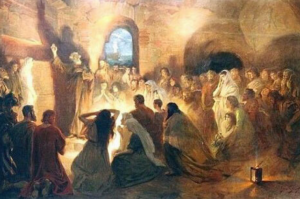A Sermon by the Rev. Dr. Arthur M. Suggs
Preached on Father’s Day, Sunday, June 17, 2018
Some Passages of Scripture Stretch Our Believability . Past the Credulity of Stories.
Let me begin with a quote from Loren Eiseley. Some of you might recognize the name. He was a naturalist, a philosopher, and he died 15-20 years ago. I looked up his obituary in The New York Times, where he was referred to as a modern-day Thoreau.
Here’s the quote:
“While I was sitting one night with a poet friend watching a great opera performed in a tent under arc lights, the poet took my arm and pointed silently. Far up, blundering out of the night, a huge Cecropia moth swept past from light to light over the posturings of the actors. ‘He doesn’t know,’ my friend whispered excitedly. ‘He is passing through an alien universe brightly lit but invisible to him. He’s in another play; he doesn’t see us. He doesn’t know.
Maybe it’s happening right now to us.’ ”
I have long known there are passages of scripture that stretch our believability and strain our credulity.
Most people venerate the Bible, and they try to believe what it says.
This is with full knowledge that at least some of the stories of the Bible are fictional from the beginning but with the intention of teaching through the story. The fable of Jonah and the Whale comes to mind, or perhaps the Book of Job.
There are also some people who simply have trouble believing certain things in the Bible, miracles, typically, such as the Virgin Birth or the Resurrection or some of the healings or turning water into wine.
Even though they might take a pass on some of the phenomena, they are just fine with the general message of the Bible.
Those aren’t what I’m talking about this morning. I’m talking about some of the things that sound okay, but the more we think about them, the more outlandish, the more impossible, and the more utterly nonsensical do they seem.
Two Examples Include the Peaceful Kingdom and the Greater Works Promised by JC.
I’m going to give you three examples. The first two won’t get me in trouble, but the third one will.
Example number one. The Peaceable Kingdom (Isaiah 11: 6-9). You hear it at Christmastime:
“The wolf shall live with the lamb,
the leopard shall lie down with the kid,
the calf and the lion and the fatling together,
and a little child shall lead them.
The cow and the bear shall graze,
their young shall lie down together;
and the lion shall eat straw like the ox.
The nursing child shall play over
the hole of the asp,
and the weaned child shall put
its hand on the adder’s den.
They will not hurt or destroy
on all my holy mountain;
for the earth will be full of the
knowledge of the Lord
as the waters cover the sea.”
It’s hard to believe that the wolf shall live with the lamb or the lion shall eat straw, at least in a literal way.
You know wolves and leopards and lions are meat eaters. They have canine teeth well-adapted for killing, and I don’t see them eating straw anytime soon.
Neither shall a nursing child safely play over the hole of an asp.
Example number two. This is in John 14, a famous passage beginning with Jesus speaking to his disciples after having foretold his betrayal:
“Do not let your hearts be troubled. Believe in God, believe also in me. In my Father’s house there are many dwelling places. If it were not so, would I have told you that I go to prepare a place for you?”
Then in response to a remark from Philip, “Lord, show us the Father, and we will be satisfied, Jesus said, “Have I been with you all this time, Philip, and you still do not know me?”
“Very truly, I tell you, the one who believes in me will also do the works that I do and, in fact, will do greater works than these because I am going to the Father. I will do whatever you ask in my name, so that the Father may be glorified in the Son. If in my name you ask me for anything, I will do it.”
This is the “greater works than these” passage.

Upon sober reflection, we look at some of the things that Jesus did: He healed people who were paralyzed, and he restored sight to people who were born blind. He turned water into wine; that was pretty cool. He walked on water, also cool. Resurrection after having been slain, not so bad.
And then my absolute favorite of all Jesus’ wonders, telling one of his disciples to cast a line and catch a fish, and in the fish’s mouth was a coin large enough to pay a tax. Now I’m sorry, but that is way cool.
But then he says that you and I can do even better, and I’m just not so sure of it. I haven’t seen anybody move a mountain or pay their taxes that way.
Do not Worry; Look at the Birds; Consider the Lilies; All Things Will Be Given.

Here is the third example that might get me into trouble. From the Sermon on the Mount (Matthew 6: 25-33). [Note: The Roman and boldface type are from the Bible; the italic type is commentary by AMS.]:
“Therefore I tell you, do not worry about your life, [Everybody who hasn’t ever worried, please raise your hands.] what you will eat or what you will drink, or about your body, what you will wear. Is not life more than food, and the body more than clothing? Look at the birds of the air; [They don’t do a lick of work, and they’re doing just fine.] they neither sow nor reap nor gather into barns, and yet your heavenly Father feeds them. Are you not of more value than they? And can any of you by worrying add a single hour to your span of life? And why do you worry about clothing?
“Consider the lilies of the field, how they grow; [They don’t do any work either, and look how beautiful they are.] they neither toil nor spin, yet I tell you, even Solomon in all his glory was not clothed like one of these.
But if God so clothes the grass of the field, which is alive today and tomorrow is thrown into the oven, will he not much more clothe you — you of little faith? Therefore do not worry, saying, ‘What will we eat?’ or ‘What will we drink?’ or ‘What will we wear?’ [Gentiles do all that stuff. Instead, keep the kingdom of God and his righteousness.] And all these things will be given to you as well.”
But this doesn’t match our experience at all.
We’ve all seen poor people who certainly don’t look or smell like lilies. Will God not much more clothe you? I want to be respectful, but apparently not, because we’ve all seen many without proper clothing, proper food, proper shelter. We know it well. Many of such poor have striven mightily for the kingdom of God.
It makes me, and maybe you, a little jaded and a bit numbed because we take these passages — the Peaceable Kingdom, the Greater Things than These, Consider the Lilies —with a grain of salt.
Maybe Jesus is exaggerating, perhaps trying to make a point with hyperbole. I don’t know, but it’s pretty hard to take such teachings seriously and literally.
Now I’m Going to Ask You to Combine Two Thoughts; One Is Easy, One Is Harder.
I want you to meld the two separate thoughts and make them into one thought.
Here is the easy one:
I want you to think about imagination. Reason about the human ability to contemplate something that isn’t in existence and imagine it as though it were in existence. Intellectualize the way in which we have that ability, and we use it every day.
Think John Lennon’s song Imagine:
<iframe width=”560″ height=”315″ src=”https://www.youtube.com/embed/VOgFZfRVaww” frameborder=”0″ allow=”autoplay; encrypted-media” allowfullscreen></iframe>
“Imagine there’s no heaven
It’s easy if you try
No hell below us
Above us only sky
Imagine all the people living for todayImagine there’s no countries
It isn’t hard to do
Nothing to kill or die for
And no religion too
Imagine all the people living life in peace, youYou may say I’m a dreamer
But I’m not the only one
I hope some day you’ll join us
And the world will be as oneImagine no possessions
I wonder if you can
No need for greed or hunger
A brotherhood of man
Imagine all the people sharing all the world, youYou may say I’m a dreamer
But I’m not the only one
I hope some day you’ll join us
And the world will be as one.(Songwriter: John Winston Lennon)
“While I was sitting one night with a poet friend watching a great opera performed in a tent under arc lights, the poet took my arm and pointed silently. Far up, blundering out of the night, a huge Cecropia moth swept past from light to light over the posturings of the actors. ‘He doesn’t know,’ my friend whispered excitedly. ‘He is passing through an alien universe brightly lit but invisible to him. He’s in another play; he doesn’t see us. He doesn’t know. Maybe it’s happening right now to us.’ ”






